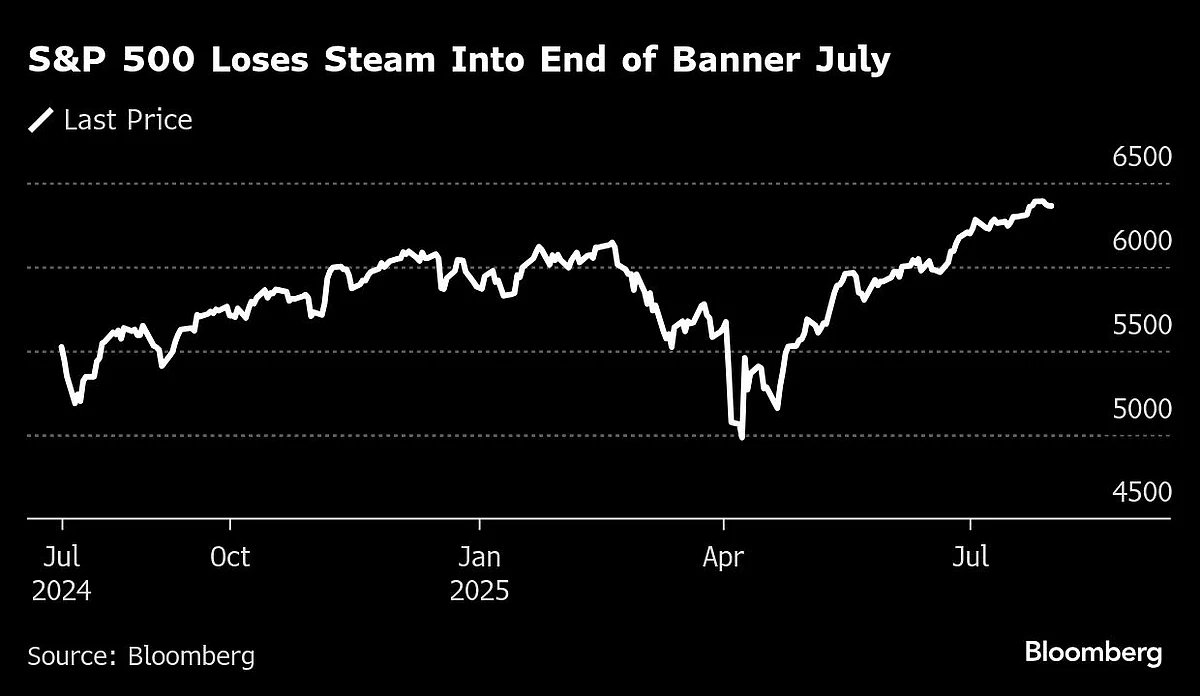Asian stocks fell for a sixth straight session — the longest losing streak this year — as President Donald Trump announced new tariff rates and as solid earnings from megacap tech firms failed to lift broader market sentiment.
The MSCI Asia Pacific Index dropped 0.4% at the open while contracts for the S&P 500 also fell by the same amount. Trump will maintain a minimum global tariff of 10%, while imports from countries with trade surpluses with the US face duties of 15% or higher, the White House announced Thursday. The dollar was little changed Friday after posting its best month of the year in July.
The Swiss franc edged lower while the Canadian dollar was steady. Thai baht held a small decline. Trump raised levies on Canada to 35% while Switzerland got a 39% rate.
The moves signaled that concerns over tariffs and economic growth were starting to outweigh the AI-driven optimism that has buoyed megacap tech stocks. While artificial intelligence remains a pillar of long-term bullishness, investors are bracing for potential trade disruptions as the US and key partners weigh new levies.
“While we expect equities to advance over the next 12 months, investors should be mindful of potential market swings in the coming weeks,” said Mark Haefele at UBS Global Wealth Management. “We think capital preservation or phasing-in strategies can be effective in navigating near-term volatility.”

The White House issued a statement just hours before midnight, the deadline Trump set last month after pausing his country-based tariffs for a second time to allow for negotiations. It was unclear exactly when the new rates would take effect.
Markets Live Strategist Garfield Reynolds says:
We’re now officially entering the era of substantial barriers to trade. The impact will hurt global trade and growth, and that’s likely to bring equities down from their recent peaks. Lingering uncertainty will also weigh on corporate decision-making, further chilling growth. While most of the levies just announced are lower than the extremes flagged on April 2, there’s a lack of rationale for many of the rates set that will add to the air of policy volatility.
Some of the tariffs were expected, such as a 25% levy on Indian exports. Others included charges of 20% on Taiwanese products, 39% on Swiss goods and 30% on South African products. Thailand and Cambodia, two countries that were said to have struck a last-minute deal, received a 19% duty.
Table of tariff rates:
Brazil, United Kingdom – 10%
Israel, Japan, New Zealand, South Korea, Turkey – 15%
Malaysia, Philippines, Thailand, Indonesia, Pakistan – 19%
Bangladesh, Taiwan, Vietnam, Sri Lanka – 20%
India – 25%
South Africa – 30%
Canada – 35%
Switzerland – 39%
Myanmar – 40%
US stocks fell Thursday, erasing an initial advance on tech earnings that sent Microsoft Corp. above $4 trillion in market value.
Apple Inc. shares rose in after-market trading following a sales beat, while those for Amazon.com Inc. fell as its outlook underwhelmed. Treasuries traded in a narrow range Thursday, gold climbed and the dollar strengthened for a sixth session.
Meanwhile, Trump sent letters to 17 of the largest pharmaceutical companies in a bid to lower prices, weakening their shares Thursday. Trump is also asking bank chief executive officers for their pitches on monetizing mortgage giants Fannie Mae and Freddie Mac, including a major public offering of stock, according to people familiar with the matter.
The yield on 10-year Treasuries was little changed at 4.37% Thursday. A stronger greenback saw the yen weaken past 150 per dollar. The weaker yen followed comments from Bank of Japan Governor Kazuo Ueda that were seen as less hawkish than expected.
The market’s attention will soon turn to Friday’s jobs report for July, which is forecast to show companies are becoming more deliberate in their hiring. Employment likely moderated after a June increase, while the unemployment rate is seen ticking up to 4.2%.
In the run-up, the Fed’s preferred measure of underlying inflation accelerated in June to one of the fastest paces this year while consumer spending barely rose, underscoring the dueling forces dividing policymakers over the path of rates.
The core personal consumption expenditures price index rose 0.3% from May. It advanced 2.8% on an annual basis, a pickup from June 2024 that underscores limited progress on taming inflation in the past year. The data also showed inflation-adjusted consumer spending edged up last month.
“Inflation remains sticky and justifies the Fed’s decision to keep rates unchanged at Wednesday’s meeting,” said Clark Bellin at Bellwether Wealth. “The stock market doesn’t need rate cuts in order to move higher and has already posted strong gains so far this year without any rate cuts.”
Key Events This Week: For top events, click here.
Some of the main moves in markets:
Stocks
-
S&P 500 futures fell 0.3% as of 9:21 a.m. Tokyo time
-
Hang Seng futures fell 0.2%
-
Japan’s Topix was little changed
-
Australia’s S&P/ASX 200 fell 0.9%
-
Euro Stoxx 50 futures fell 1.3%
Currencies
-
The Bloomberg Dollar Spot Index was little changed
-
The euro was little changed at $1.1422
-
The Japanese yen was little changed at 150.77 per dollar
-
The offshore yuan was little changed at 7.2080 per dollar
Cryptocurrencies
-
Bitcoin fell 0.6% to $115,796.67
-
Ether fell 1% to $3,697.05
Bonds
-
The yield on 10-year Treasuries was little changed at 4.38%
-
Japan’s 10-year yield was unchanged at 1.545%
-
Australia’s 10-year yield advanced three basis points to 4.30%
Commodities
-
West Texas Intermediate crude rose 0.2% to $69.37 a barrel
-
Spot gold was little changed
. Read more on Markets by NDTV Profit.
